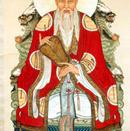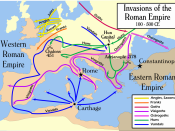Relationships between the individual and society vary between cultures, religions and ethnicities. Nevertheless, throughout history, how the individual is seen in society varies accordingly. In Medieval Europe, China and Islamic countries, religious beliefs and different philosophies greatly contributed and effected how individuals in a community acted and interacted with their society and other countries. Different lifestyles and common norms contributed to the differences in relationships because how the community interacted with each other influenced the way society acted in general. In some societies individualism was stressed where as in others the importance of community was emphasized. As a result, these ideas shaped the way society ultimately acted.
In medieval Europe, an individuals primary concern was to ensure that they would have security to seek survival. Particularly in Rome, the church was seen as being the most influential institution because it was a place where individuals could seek and obtain answers about questions regarding concerns or others problems they may have had.
Furthermore, there was no division between the church and state. In a political sense, as well as a spiritual sense, the Roman Catholic Church was very much the focal point of a Medieval man's life. Between the collapse of control of the Roman Empire around 500 A.D. and the Renaissance in the middle 1400s, the Church remained the most continuously powerful organization in Europe (Daum website). The church was the richest institution in society and as a result had the most power over society. The importance of individualism was not stressed as people commonly worked together and shared their ideas and common interests. All the same, the individual was seen to have had a close tight nit relationship with the rest of society as it determined their status and how well they lived. At that time, Western Europe...


